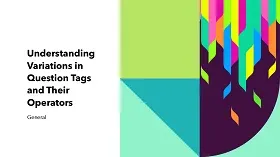Variation in the Operator or Subject in Question Tags
Question tags are a fascinating aspect of English grammar, often reflecting subtle variations in the operator or subject. These variations can reveal regional differences, colloquial usage, and even historical influences. Below, we explore these variations in detail, with clear explanations and examples.
The Anomaly of aren’t I?
One of the most frequent anomalies in question tags is the use of aren’t I?. This form has a complex history and social acceptability, similar to ain’t. While it is standard in British English, it was once considered a Briticism in American English. However, it is now widely used colloquially in the United States.
✧ I’m talking too much, aren’t I? (1987 Hart 139)
Variations with have to, have got, and have got to
In British English, the verb have can be treated as either an operator or a main verb in question tags. When treated as an operator, have is used directly in the tag. When treated as a main verb, do is inserted instead. In American English, do is regularly used in such constructions.
✧ I had to see her, hadn’t I? (1979 Snow 34)
✧ I’ve got to do something right, haven’t I? (1986 Oct. 19 Sunday Times 25/4)
✧ I’d still got the hots for her, hadn’t I? (1987 Hart 101)
✧ They have to look as though they’re earning their money, don’t they? (1979 Snow 190)
Other Operator Anomalies
Question tags can also exhibit other anomalies, such as changes in tense or operator:
✧ What’s this about ... the American Civil War, was it? (The tense has changed.) (1984 Price 23)
✧ I shall have to ask him, won’t I? (The operator has changed.) (1986 Dec. 21 Masterpiece Theatre Paradise Postponed)
Echoing Subordinate Clauses
In some cases, the question tag echoes a subordinate clause rather than the main clause, which might be unexpected:
✧ Grand office you’ve got here, haven’t you? (1979 Snow 256)
✧ It’s Mr Lincoln’s war we’re curious about, aren’t we? (1984 Price 84)
(The expected tag in both cases would be isn’t it?)
Negative Operators in Question Tags
While negative operators in question tags are usually formed with the contraction n’t, the full form not may also be used after the subject pronoun:
✧ The new man at Private Eye, he is a dreadful little man, is he not? (1987 Mar. 25 Punch 55/1)
Colloquial Assimilation of Question Tags
In colloquial speech, question tags like isn’t it are often assimilated in pronunciation and reduced to two syllables, spelled variously as innit, in’it, or in’ert. Similarly, other tags like ain’t it, didn’t it, and isn’t he have parallel colloquial forms.
✧ “Shopping, for me, meant a sample sale or advance ordering from designers’ collections at wholesale prices.” Coo, another world, innit? (2003 June 20 Times T2 3/3)
✧ That’s three in’it? [reference to cricket] (1985 Ebdon 138)
✧ Still . . . that’s a perk of living in the country, in’ert? (1985 Ebdon 176)
✧ Well, Mick, ’e’s on the sick, like us, in’e. (1995 Jones 132)
✧ “Right leg amputation, ennit?” “No!” I exclaimed, sitting up in alarm. “Just a minor knee operation.” (1995 Lodge 9)
✧ Came in the post this morning, dinnit? (1992 Dexter 235)









